#anemoi
Text
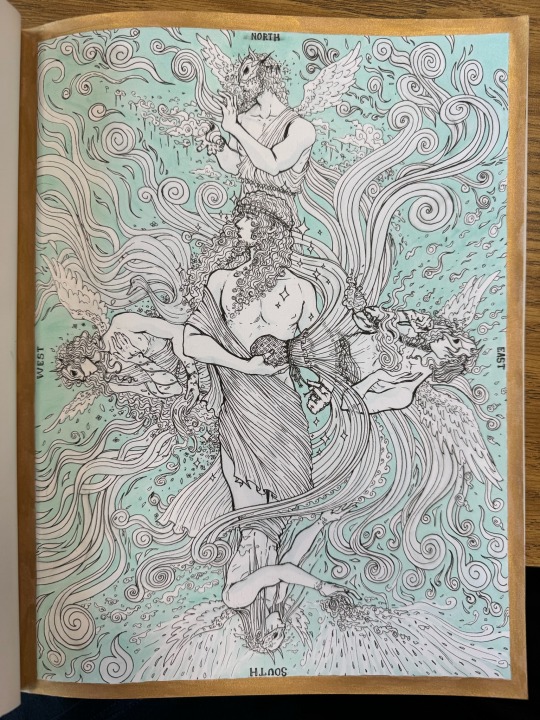
The four winds ❄️🍃💧🍂
#my art#art#fanart#sorta#greek mythology#Greek myth#the four winds#anemoi#aeolus#Boreas#zephyrus#Eurus#notos#notus#the odyssey#the oh hellos#they wrote great some great albums based on these guys go listen#mythology and folklore#mythology#ink#alcohol based markers#alcohol markers#metallic ink
109 notes
·
View notes
Text

Common art style found in Anemoi. Beasts like this are often painted like wards for bad luck
636 notes
·
View notes
Text
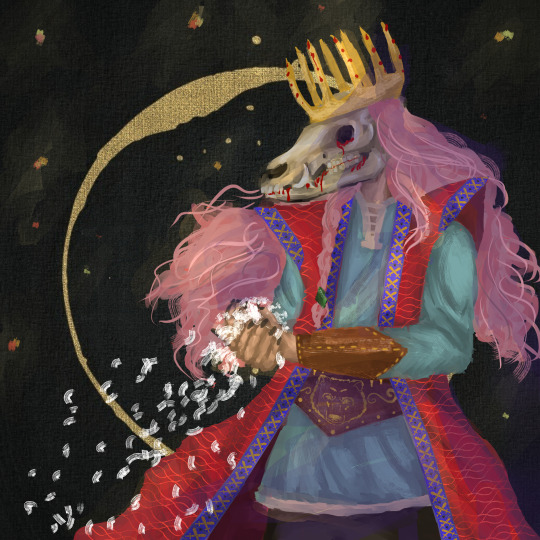


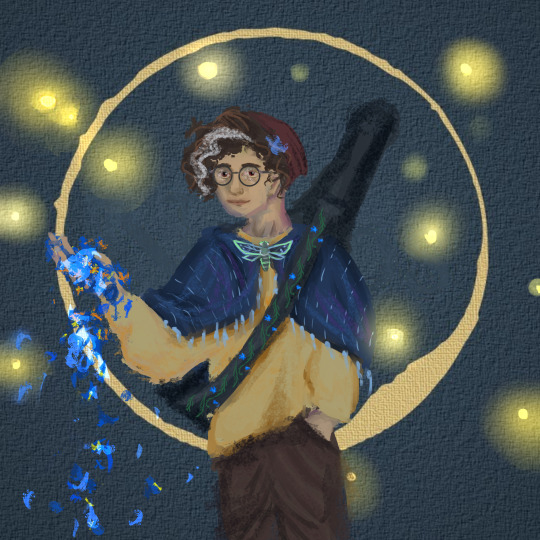

sbi anemoi, inspired by @axiliern
158 notes
·
View notes
Text
Thought I’d share these for anyone who hasn’t seen them :) They’re the official descriptions for each of the Anemoi albums on The Oh Hellos’ website!
Notos
Notos, the first installment in an ongoing series, is named for the ancient Greco-Roman god of the south wind, who brought storms in the summer. Musically, the record draws from the siblings' memories of summers spent exploring the Pacific Northwest with their grandparents, as well as their experiences with the frequent threat of hurricanes as they grew up on the Texas Gulf Coast. Thematically, the series considers the question: "where did our ideas come from?" Notos recounts a time when the duo weren't even aware there was a question to ask, and reflects on the backfire effect we experience when confronted with new information for the first time.
Eurus
Once that first question posed in the Notos EP is asked — "where did my ideas come from?" — it opens the floodgates to more. While wrestling with them all can ultimately lead to a fuller understanding of the world around you (and leave you with more empathy than you started with), it can also leave you feeling alienated from the communities you used to identify with. Eurus, released in early 2018 as the second installment in a series, is a continued interrogation of our own beliefs, and as Eurus was the wind most closely associated with autumn, the record seeks to capture the feelings of dark woods, dry branches, dead leaves, and wondering who had migrated — you, or your flock?
Boreas
Boreas, the northern wind, ushered in the harsh frosts of lonely winter. The arrangements of this third installment evoke images of snow-blanketed darkness, candlelight behind cupped hands, and a vast night sky ribboned with stars and auroras. As we wrote these songs, we found ourselves confronted with the ways we’ve personally and communally reflected the character of this wind — how we often avoid discomfort, even at the expense of others, until we are left cold, hard, and unfeeling. In this record, we ask the winter to instead kindle us into something warmer and softer than who we’ve been.
Zephyrus
The series concludes. Zephyrus, the final cardinal wind of this project, brought the gentle warmth of spring that summoned up a new year of growth rooted in the fertile ashes of all the structures that keep us isolated and unfeeling — the kind of growth we can see in ourselves, if we can muster the courage to be vulnerable. The arrangements mirror and embrace this shift, rising up like tender leaves breaking through concrete and cascading down like mountain rivers surging with the first thaw of the season. It’s been a long year; thanks for listening.
#i just discovered this website actually it has a lot of nice stuff about their albums! look it up if you’re curious#oh hellos#the oh hellos#music stuff#folk music#anemoi#anemoi albums#the four winds#four winds#the four winds albums#four winds albums#dear wormwood#through the deep dark valley#ttddv#Notos#Eurus#Boreas#Zephyrus#albums#fav albums
83 notes
·
View notes
Text



I like to imagine Hermes, Iris, and Thanatos as a fun trio who has annual meet-ups to plot shenanigans together
145 notes
·
View notes
Text
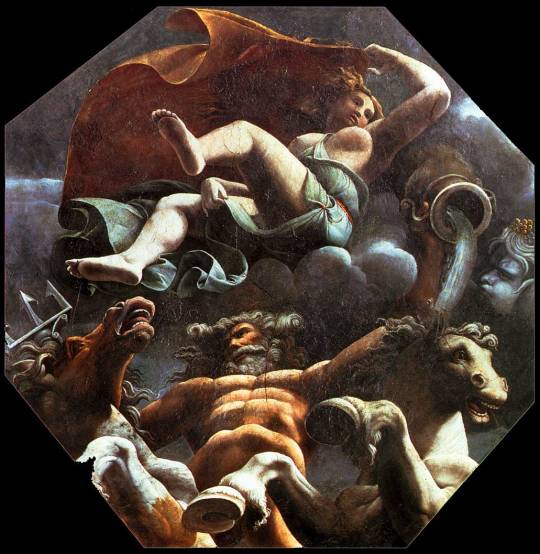
Rinaldo Mantovano - Anemoi Transports Psyche Over the Sea. 1527
47 notes
·
View notes
Text
Zeus of the life-giving rains,
great lord upon high who oversees all
and you, blessed Anemoi, and the Horai too
we labour and sweat under the scorching sun
the oppressive heat taking its toll
aid us please and reduce the sting of summer
like this cool water I offer in thanks
deliver light cooling breezes to us
29 notes
·
View notes
Note
Good afternoon!!
I’m searching for information on Zephyrus. Have you had any experience with him? If not that’s cool. I can’t seem find any followers of his.
Hey there!
Unfortunately, I do not worship Zephyrus nor do I have any experience with him. I did do some brief research about him for you, though!
I do, however, have some information that I can share that may help you! This is stuff I am finding online through various sources; I'm mostly trying to stick to historical sources.
Zephyrus
• Frankincense is a common offering for all Anemoi
• You can find hymns written to the Anemoi among the Orphic Hymns (hymn 80 is specifically for Zephyros)
• Zephyrus, the West Wind, is considered the gentlest of the four winds and is a bringer of spring, carrying seeds on his winds and warming up the earth
• Here is a prayer to the four winds, including one specifically for Zephyrus, that I found
• General Hellenic offerings that can be given to most gods (including Zephyrus) would include clean water, wine, milk, cheese, grains, fruits, veggies, olives, bread, meat, olive oil, and figs
• There are no historical festivals for Zephyrus (or any Anemoi), but people typically celebrate him with the coming of spring, specifically the spring equinox
• Offerings you can give to Zephyrus would be feathers (always clean ones found in nature first), flowers (especially those that bloom in spring), unripe fruits, swan imagery, horse imagery, and tiger imagery
• He is married to Khloris (Chloris), goddess of greenery, according to Ovid (the Dionysiaca also claims Iris, goddess of rainbows and messenger of Hera, to be his wife)
• His children are said to be Xanthos, Balios, Eros, Pothos, Areion, Karpos, literal tigers, and literal horses
• Some of his known epithets (based mostly on what I could find in the Orphic Hymn and Theoi.com's mentioned sources; I couldn't find the original Greek, so it's just in English, sorry) are Sea-born, Aerial, Unseen, Lightwinged, Richest of all Winds, Brightening, Nimble God of Wayside Shrines, Golden-haired, Rapid, Swift, Gentle, Kindly, Lightest of all Things, Storm-blowing, Blustering, Stormy, Straight-flown, Strongly Blowing, Light (as in "light as a feather"), Earth-born (gigantos; only translated word I found), and The Gentle Breeze
• I know this is a very over used source, but I highly recommend checking out Theoi.com s entry on Zephyrus for more information about him
----
Truthfully, this is all I can find. I'm also having a hard time finding any worshippers of his online, but maybe one of my followers will see this and reblog with additional information. If they do, I'll be sure to reblog it so that you can hopefully see the addition.
I hope this helps a little, at least, and I hope you have a good night/day! 🧡🌬️
#zephyrus#helpol#hellenic polytheism#hellenic pagan#hellenic pantheon#deity worship#anemoi#asks#answered asks
22 notes
·
View notes
Text
Do you think that making a "Are you Notos, Eurus, Boreas, or Zephyrus" quiz would introduce the Soldier Poet King fans to more of the Oh Hellos music or has that (Theseus's) ship already sailed?
#the oh hellos#soldier poet king#anemoi#would genuinely love to see more people discovering their music beyond what made it big on tiktok#anyway i am being tempted into making a uquiz account
76 notes
·
View notes
Text
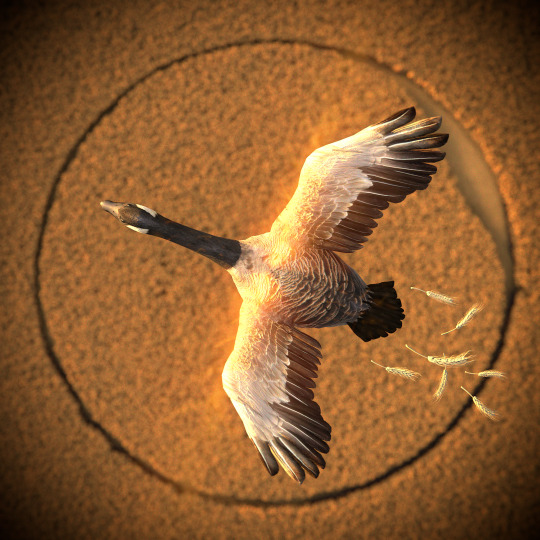
Eurus
AND THUS, THE FOUR WINDS ARE COMPLETE
this one is slightly different from the previous ones since I don't have the Goose in the same pose/angle as the original cover art, but I got the idea for the crop circle in the background and I HAD to do it this way
here are the usual credits I gotta do:
Goose by NonCG (yes I actually spent money for this render ;-;)
"Wheat — FREE" by Yaroslav Karas is licensed under Creative Commons Attribution.
AND HERE ARE ALL FOUR OF THE ANEMOI IN ONE IMAGE
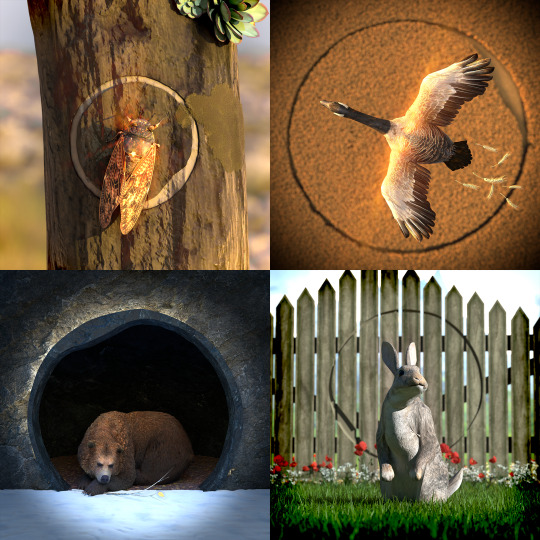
here are the links to each one's original post:
Boreas | Zephyrus | Notos
I might do this again
but maybe in a different style? we'll see :3
#blender#blender 3d#the oh hellos#indie folk#indie rock#oh hellos#3d artwork#eurus#four winds#anemoi#my art
31 notes
·
View notes
Text
The Anemoi
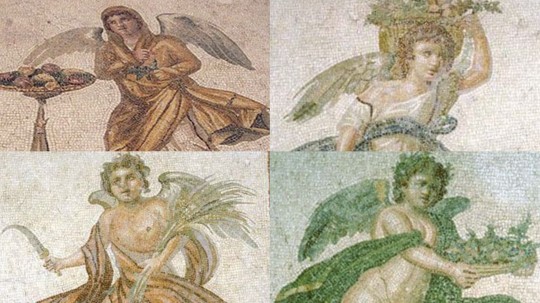
Hesiod, Theogony 869 ff :
"Notos (the South Wind) and Boreas (the North Wind) and clear Zephyros (the West Wind). These Winds are a god-sent kind, and a great blessing to men."
The Anemoi are the gods of the winds, especially the main four, but there are up to 24 different winds. Eight of these winds appear on Wind Towers, like the one in Athens, and act as both a devotional object, as the winds were often worshiped together as the Anemoi, and as a directional tool.
The Anemoi are all ruled by Aeolus, son of Hippotes, who was appointed to this position by Zeus. The winds themselves are the children of Eos, goddess of the dawn, and her husband Astraeus, an astrological god also associated with dusk/twilight.
In mythology and poetry, they often appear as tools of the Olympians, especially Zeus and Poseidon, who can command the winds to help in their endeavors, though they do appear helping other gods as requested. However, the witch Medea also calls on the Anemoi to aid in her magic.
Ovid, Metamorphoses 7. 192 ff (trans. Melville) (Roman epic C1st B.C. to C1st A.D.) :
"[The witch] Medea . . . in the deep stillness of the midnight hour . . . To the stars she stretched her arms, and thrice she turned about and thrice bedewed her locks with water, thrice a wailing cry she gave, then kneeling on the stony ground, ‘O Nox (Night) [Nyx], Mother of Mysteries, and all ye golden Astra (Stars) who with Luna (the Moon) [Selene] succeed the fires of day, and thou, divine triceps (three-formed) Hecate, who . . . dost fortify the arts of magic, and thou, kindly Tellus (the Earth) [Gaia], who dost for magic potent herbs provide; ye Venti (Winds) [Anemoi] and Aurae (Airs) . . . be with me now! By your enabling power, at my behest . . . my magic song rouses the quiet, calms the angry seas; I bring the clouds and make the clouds withdraw, I call the winds and quell them.’"
From this, other ancient magical practioners took inspiration.
Pausanias, Description of Greece 2. 12. 1 (trans. Jones) (Greek travelogue C2nd A.D.) :
"In Titane there is . . . an Altar of the Anemoi (Winds), and on it the priest sacrifices to the Anemoi (Winds) one night in every year. He also performs other secret rites [of Hekate (Hecate)] at four pits, taming the fierceness of the blasts [of the winds], and he is said to chant as well the charms of Medea."
The Ruler of the Anemoi - Aeolus
Aeolus is the God of the Winds and the king of the island of Aeolia. He was appointed as Keeper of the Winds by Zeus. Aeolus supposedly kept the most brutal of winds trapped in a cave on Aeolia. He was sometimes petitioned to let them loose to aid in some cause, by both gods an mortals. He is sometimes portrayed as a face in the sky blowing on some object, a trait he shares with all of the Anemoi. His sacred animal is the kingfisher.
His most famous appearance by far is his role in Homer's Odyssey:
Homer, Odyssey 10. 1 ff (trans. Shewring) (Greek epic C8th B.C.) :
"[Odysseus tells the tale of his wanderings :] We came to the Aiolian (Aeolian) island (nesos Aiolios); here lived Aiolos (Aeolus) Hippotades (son of Hippotas); the deathless gods counted him their friend. His island is a floating one; all round it there is a wall of bronze, unbreakable, and rock rises sheer above it. Twelve children of his live in the palace with him; six are daughters, six are sons in the prime of youth; moreover the king has given his daughters as wives to his sons. These all hold a continual feast with their dear father and much-loved mother; countless dainties are there before them, and through the daytime the hall is rich with savoury smells and murmurous with the sound of music. At night they sleep, each with his own chaste wife, on inlaid bedsteads with coverlets over them.
To their city and noble palace we now came, and for a whole month Aiolos gave me hospitality and questioned me on all manner of things, Ilion [i.e. Troy] and the Argive ships and how the Akhaians (Achaeans) sailed for home. I duly told him all he desired; then in my turn I asked his leave to depart and begged him to help me on my way. Nor was he unwilling; he set about speeding my return. He gave me a bag made from the hide of a full-grown ox of his, and in the bag he had penned up every Wind (anemos) that blows whatever its course might be; because Kronion (Cronion) [Zeus] had made him warden of all the Winds (anemoi), to bid each of them rise or fall at his own pleasure. He placed the bag in my own ship's hold, tied with a glittering silver cord so that through that fastening not even a breath could stray; to Zephyros (the West Wind) only he gave commission to blow for me, to carry onwards my ships and men. Yet he was not after all to accomplish his design, because our own folly ruined us.
For nine days and through nine nights we sailed on steadily; on the tenth day our own country began to heave in sight; we were near enough to see men tending their fires on shore. It was then that beguiling sleep surprised me; I was tired out, because all this time I had kept my own hands on the steering-oar, never entrusting it to one of the crew, for I wished to speed our journey home. Meanwhile the crew began murmuring among themselves; they were sure I was taking home new presents of gold and silver from Aiolos.
One of them would say as he eyed his neighbour : ‘What injustice! In whatever city or land he comes to, this man wins everyone's friendship and regard. He is taking back a mass of fine things from the spoils of Troy, while we who have journeyed with him from the first to last are returning home all empty-handed. And now come these latest gifts that Aiolos in his hospitality had indulged him with. Come, let us look without wasting time. What are these gifts? How much gold and silver is there inside the bag?’
Thus the men talked among themselves, and the counsels of folly were what prevailed. They undid the bag, the Winds (anemoi) rushed out all together, and in a moment a tempest (thuella) had seized my crew and was driving them--now all in tears--back to the open sea and away from home.
I myself awoke, and wondered if now I should throw myself overboard and be drowned in ocean or if I should bear it all in silence and stay among the living. I did bear it and did remain, but covered my face as I lay on deck. My own ship and the others with it were carried back by raging storm (anemos thuella) to the island of Aiolos (nesos Aioloios), amid the groaning of all my company.
There we set foot ashore and drew water, and without delay my crews and I took our meal by the rapid ships. When we had had our portion of food and drink, I chose to come with me one man as my own attendant and one besides; then I sent up to the place of Aiolos, and found him feasting there with his wife and children. We went in and we sat down at the threshold by the doorposts, while the household asked in deep amazement : ‘Odysseus, how is it that you are here again? What malicious god has set upon you? Surely we did our best before to speed you upon your way, meaning to reach your own land and home or whatever place you might desire?’
So they spoke, and I said despondently : ‘Faithless comrades were my undoing, they and the slumber that betrayed me. But you are my friends; you have the remedy; grant it me.’
With these humble words I made my appeal to them. They remained in silence, except the father, who answered me : ‘Away from this island, away at once, most despicable of creatures! I am forbidden to welcome here or to help send elsewhere a man whom the blessed gods abhor. This return reveals you as god-forsaken; go!’
And with these words he drove me forth despite my pitiful lamentations. Then we sailed onwards sick at heart."
The Four Cardinal Winds
Boreas (Roman name: Aquilo/Septentrio)
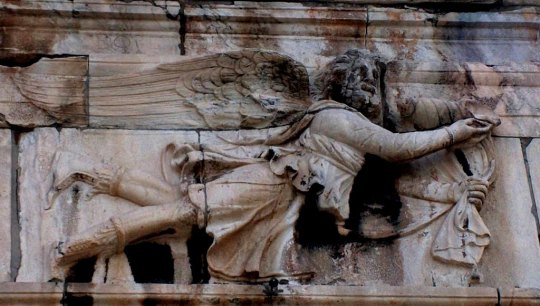
Of all the Anemoi, Boreas is the one we have the most information about. He is the god of the north wind and is associated with cold temperatures and the mountains in the north of Greece, and therefore, the element of earth. From his name, we get the term aurora borealis. Boreas was famous for his strength and temper. He is often depicted with shaggy hair and beard, with a billowing cloak and a conch shell in his hands. His sacred animal is the horse.
He is represented on ancient compass roses in the north with the name Septentrio.
In mythology:
Boreas delivered Leto to Poseidon by order of Zeus, so Poseidon could take her to the island of Ogygia where she would be safe to give birth to Apollo and Artemis.
Boreas was said to have kidnapped an Athenian princess he had taken a shine to named Orithyia. Originally, he had attempted to convince her to come with him, but when she refused, he kidnapped her instead, showing the temper he was well known for. She did not consent, but their children include sons Zethes and Calais (of Argonaut fame), Chione, the goddess of snow, and another daughter named Cleopatra (unrelated to the Egyptian queen). It is through his relationship with Orithyia that he came to be a "son-in-law" of Athens and the Athenians.
In another story, Boreas competed with Pan for the affections of a nymph named Pitys. Boreas tried to prove his might by uprooting all of the trees. Unfortunately, Pan only laughed at Boreas' show of strength and his joviality won Pitys' affection. Angered by her rejection, Boreas threw Pitys' off a cliff, where she died. Gaia took pity on the nymph and transformed her into a pine tree.
In an Aesop fable, Boreas competed with his uncle, Helios, to get a travelling passerby to remove his cloak, in an attempt to prove which god was strongest. Boreas tried to blow the cloak off the man, but the harder he blew, the tighter the man wrapped the cloak around himself. Helios instead, made the sun shine bright and heat the land. The man removed his cloak when it got too hot. The moral of the story is that persuasion is better than force.
According to Pausanias, Boreas blessed Musaeus of Athens with the gift of flight.
Pausanias, Description of Greece 1. 22. 7 (trans. Jones) (Greek travelogue C2nd A.D.) :
"I have read verse in which Musaios (Musaeus) [the poet] receives from Boreas the gift of flight, but, in my opinion, Onomakritos (Onomacritus) wrote them."
[N.B. Musaios and Onomakritos were both Orphic poets.]
There are many claims that Boreas, in the form of a stallion, impregnated mares across the ancient world, and variations on these stories appear in Homer's Iliad and Virgil's Georgics 3.
In the Orphic Hymns, Boreas is also listed as a god of the season of winter.
Orphic Hymn 80 to Boreas (trans. Taylor) (Greek hymns C3rd B.C. to 2nd A.D.) :
"To Boreas (the North-Wind), Fumigation from Frankincense. Boreas, whose wintry blasts, terrific, tear the bosom of the deep surrounding air; cold icy power, approach, and favouring blow, and Thrake (Thrace) awhile desert, exposed to snow: the air's all-misty darkening state dissolve, with pregnant clouds whose frames in showers resolve. Serenely temper all within the sky, and wipe from moisture aither's splendid eye."
The cult of Boreas:
Boreas was worshiped as a protector of Athens and sacrificed to when the city needed protection, though it is unknown exactly what these sacrifices were.
There are a few different accounts, but the main plot is this:
The Athenians received a message from an oracle that to protect the city, they should call on their ally who was a "son-in-law" of Athens/the Athenians. Boreas was considered a son-in-law of Athens because of his marriage to Orithyia, who was an Athenian princess. The Athenians made sacrifices to both Boreas and Orithyia in the hopes that they would destroy a barbarian fleet threatening them. The fleet was destroyed and a special district dedicated to Boreas was created.
Notos (Roman name: Auster/Australis, Notus when the Greek name was retained with Latin spelling)

Notus is the god of the south wind and is associated with winds from the sea to the south of Greece. He is usually depicted pouring water from a vase, like rain on crops. The winds he brings are hot. He is also said to be responsible for the storms of late summer and early autumn in Ancient Greece and Rome, indicating that his winds are both hot and moist, carrying moisture from the Mediterranean sea to the south onto the continent to the north, corresponding to the element of water. He was also feared as a destroyer of crops. On ancient compass roses, he is represented by the name Australis, from which the name Australia is derived. Notus does not have any sacred animal mentioned for him alone, but the horse is sacred to the Anemoi as a group.
The Romans associated him with the clouds and harsh winds and storms that would blow in from the south.
In Mythology:
Notus does not appear prominently in mythology outside of helping the other gods when called upon, usually with his brothers.
In the Orphic Hymns, Notus is associated with the season of Summer.
Orphic Hymn 82 to Notus :
"To Notos (Notus, the South-Wind), Fumigation from Frankincense. Wide-coursing gales, whose lightly leaping feet with rapid wings the air's wet bosom beat, approach, benevolent, swift-whirling powers, with humid clouds the principles of showers; for showery clouds are portioned to your care, to send on earth from all-surrounding air. Hear, blessed power, these holy rites attend, and fruitful rains on earth all-parent send."
Euros (Roman name: Vulturus/Volturus, but Roman poets often retained the Greek name with the Latin spelling Eurus)
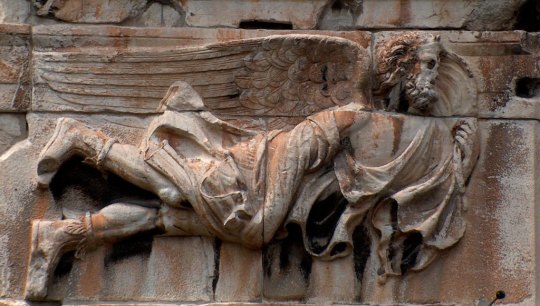
Euros is the god of the east wind and dwelt near the palace of Helios, his uncle. He is said to bring a hot wind, and with his close proximity to Helios, is associated with the element of fire. Little else is known about Euros, as he is the least mentioned of all the Anemoi. Euros is depicted as a bearded man holding a heavy cloak. No animal is known to be sacred specifically to Euros, but horses are sacred to all of the Anemoi as a single group.
In Mythology:
Most references to Euros in mythology are passing. Most of what is attributed to Euros comes from the poets of the time, including Homer, Virgil, and Ovid.
One source lists Euros as the "Savior of Sparta."
Greek Lyric V Folk Songs, Frag 858 (from Strasbourg papyrus) (trans. Campbell) (B.C.) :
"Send a breeze then, over the fields . . . soft wind . . . Euros (East Wind) : Euros, saviour of Sparta, may you come with victory at all times! Ie Paian, ieie Paian!"
Euros is unofficially the god of Autumn. He fills the fourth seasonal slot most modern people associate with autumn, however, the ancient Greeks only recognized three seasons. There are no mentions of him in the Orphic Hymns.
It is important to note that Euros sometimes appears as the god of the southeast wind and Apeliotis as the east wind. Apeliotes also has associations with autumn.
Zephyros (Roman name: Favonius, Zephyrus when the Greek name was retained with Latin spelling)

Zephyros is the god of the west wind and is depicted as a beardless youth scattering flowers from his mantle, often with wings, associating him with the element of air (though, arguably all of the Anemoi are related to air). He and his winds were said to be most gentle and provided ships with favorable winds for sailing. He was known as the fruictifying wind and the messenger of spring. He is sometimes depicted as carrying a basket of unripe fruit. His sacred animals are his offspring, the horse and the tiger.
In Mythology:
Zephyros most famously appears in the myth of Apollo and Hyacinthus. Both gods were in love with a Spartan man named Hyacinthus. Apollo and Hyacinthus often spent time together, and one day, started a game of discus. Zephyros spotted them, and in a jealous rage, blew the discus off course, which then struck Hyacinthus in the forehead and killed him. Apollo, in his grief, turned Hyacinthus into a flower (either an iris or larkspur, depending on the telling).
Zephyros vied with his brother, Boreas, for the love of the nymph, Chloris (Flora in Roman mythology). Boreas, however, stole Orithyia from her father's home instead, allowing Zephyros to pursue Chloris uncontested. He married Chloris and made her the goddess of flowers.
Zephyros also had a relationship (or marriage, depending on the source) with the messenger of the Olympians and goddess of rainbows, Iris. Sometimes, they are listed at the parents of the Erotes: Pothos, Eros, and Himeros, though other accounts list their mother as Aphrodite. In other accounts, Eros was the son of Iris and Zephyros (or Aphrodite), and Pothos and Himeros the children of Eros, making them the grandchildren of Iris and Zephyros (or Aphrodite).
In the story of Eros and Psyche, it is Zephyros who delivers Psyche to the home of Eros.
Through the harpy Podarge, Zephyros was the father of the horses of Achilles, Balius and Xanthus, mirroring his opposite brother Boreas's association with horses.
Roman mythology gives him the additional domain of plants and flowers
In the Orphic Hymns, Zephyros is associated with Spring.
Orphic Hymn 81 to Zephyrus :
"To Zephyros (Zephyrus, the West-Wind), Fumigation from Frankincense. Sea-born, aerial, blowing from the west, sweet Breezes (Aurai, Aurae), who give to wearied labour rest. Vernal and grassy, and of murmuring sound, to ships delightful through the sea profound; for these, impelled by you with gentle force, pursue with prosperous fate their destined course. With blameless gales regard my suppliant prayer, Zephyros unseen, light-winged, and formed from air."
The Cult of Zephyros:
There were two known temples to Zephyros, one on the Isle of Rhodes, and the other in the town of Laciadae. It is also said that the Argonauts made an altar to Zephyros, among others, while preparing to depart on a voyage.
The Lesser (Tertiary) Winds
These wind gods cover the tertiary directions and are featured on wind towers and early compass roses, but little is known about them.
Lips (Roman name: Africus)
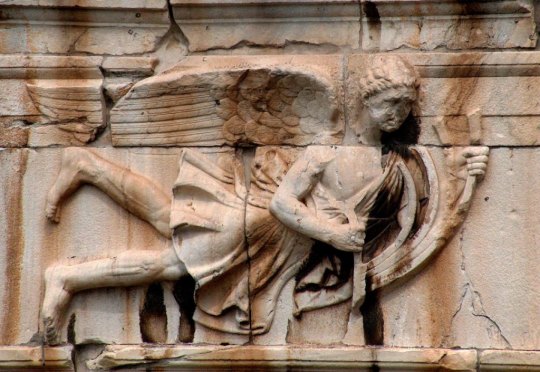
Lips is the god of the southwest wind and is depicted on the Tower of the Winds in Athens as a winged man holding the stern of a ship. He was a favorite of sailors.
KAIKIAS (Roman name unverified)
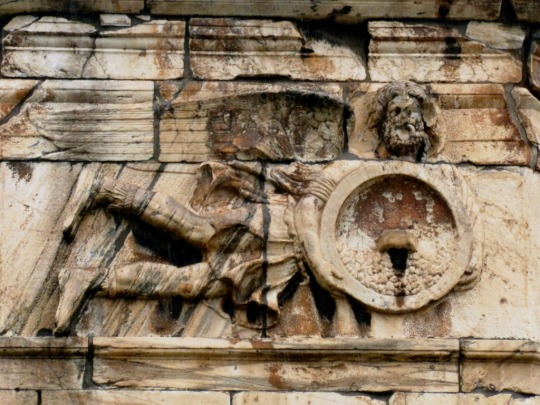
Kaikias is the god of the northeast wins and is portrayed as a bearded man with a shield full of hail-stones. These hail stones may reference severe, destructive storms.
APELIOTES (Roman name unverified)

Apeliotes is the god of the southeast wind and is depicted as a clean-shaven man, holding a cloak full of fruit and grain. He is associated with autumn and sometimes switches places with Euros.
SKIRON (Roman name unverified)
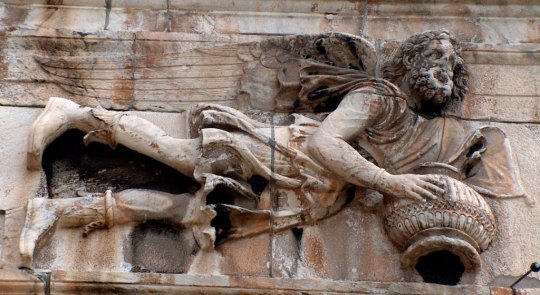
Skiron is the god of the northwest wind and depicted as a bearded man tilting a cauldron, potentially signifying the onset of winter. He is also associated with violent storms and winds.
73 notes
·
View notes
Text
Notos, spraying a melted cutting board with a tiny water gun: We gotta cool this bitch down. Cool it down.
Euros: I actually just put the cutting board in the oven...
Boreas, visibly confused: Okay, so he decided to put the cutting board in the oven?
Notos, spraying Euros: You FUCKING DUMBASS!
Euros: Dude, I forgot-
Notos: OH MY FUCKING GOD! We're trying to make Chicken Alfredo right now, and you fucking MELT the cutting board in the oven at 400 DEGREES FAHRENHEIT!?
Zephryos: *Watching in complete confusion while trying to process this whole situation.*
#zephryos is so me#mythology memes#incorrect quotes#incorrect mythology#incorrect mythology quotes#greek mythology#incorrect greek myths#greek myths#incorrect greek mythology#incorrect greek quotes#incorrect greek gods#greek gods#sky gods#anemoi#boreas#zephryos#euros#notos#ancient greek mythology#greek mythology quotes
21 notes
·
View notes
Text

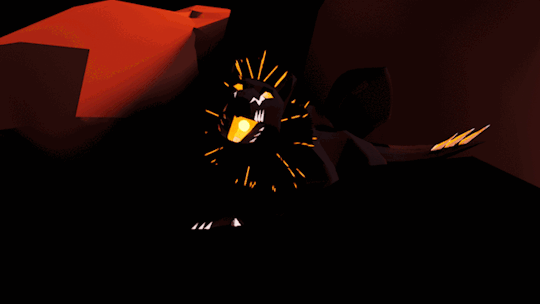
Exitium is here for National Appreciate a Dragon Day! 🐉
#National Appreciate a Dragon Day#dragon#3d#blender#exitium#ascendancy#art#digital art#my art#digitalart#oc#anemoi#enkavaima#fire#lava#magma#🐉
41 notes
·
View notes
Text
Constellations
little loop I made for a Constellations lyric video I uploaded to one of my multiple YouTube channels fdgkhijndfgijkh
you can find that here if you want
#blender#blender 3d#3d artwork#animation#the oh hellos#oh hellos#four winds#anemoi#constellations#notos
7 notes
·
View notes
Text
OH MY GOSH GUYS I’M GOING CRAZY THERE’S A PERFECT SONG CONNECTION IN SOAP
So you know this lyric at the end of Notos?
“Da da da da you gotta let go”
IN SOAP THEY SAY:
“But your sums and your pieces
Are enough to make you whole
You gotta let go”
ITS A DIRECT LYRICAL REFERENCE TO NOTOS AHHH
I love this so much because Notos is the narrator realizing their mistakes and taking that first step towards change!
And in Soap, the narrator is trying to help their partner embrace change, so they’re teaching them the same lesson they learned wayyy at the beginning of their journey!
Not to mention Notos is the start of the Anemoi EPs and Zephyrus is the end, adding even further onto the cycle motif repeated throughout all four albums :)
#i noticed this when listening to soap the other day and LOST IT#notos is one my fav songs Im so happy they put that connection there#THERES SO MANY OTHER LYRIC CONNECTIONS IN SOAP I NEED TO TALK ABOUT THEM ALL SOON#IT MAKES ME SO HAPPY BC I LOVE THAT SONG AND IT MAKES EVERYTHING FEEL SO WHOLE AND COMPLETE LIKE WE’RE GETTING CLOSURE#the oh hellos#oh hellos#indie band#indie folk music#indie songs#indie folk#indie music#indie rock#folk band#folk songs#folk music#folk music >>>>>>#anemoi#anemoi albums#four winds albums#four winds#notos#eurus#zephyrus#Boreas#music stuff#song recs#song analysis#the oh hellos are amazing#the oh hellos lyrics#songs to listen to
26 notes
·
View notes
Text
44 notes
·
View notes